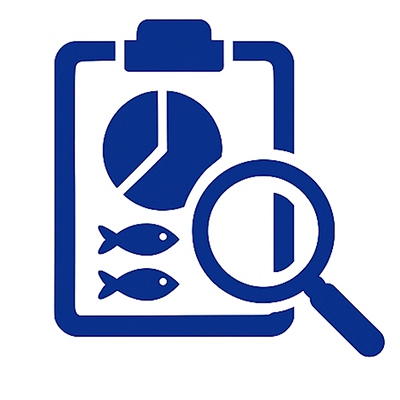
Response to Marine Strategy Consultation
Sea Anglers – It’s Time to Raise Your Voice on UK Marine Health!
Angling community: DEFRA has just launched the UK Marine Strategy Part One Update 2025 consultation, and this is your chance to shape the future of our seas.
Why this matters to you:
The latest assessment shows UK fish stocks are still in the red, failing to meet key targets under “Good Environmental Status” (GES)
This update highlights that many species remain critically depleted, jeopardising the very fish we chase
The strategy aims to manage fisheries through an ecosystem-based, precautionary approach, improving stock levels and protecting habitats vital for spawning and feeding
What DEFRA wants, but needs our input on:
Fisheries authorities plan to align catch limits with Maximum Sustainable Yield (MSY) to rebuild stocks (A chance for us to promote superior harvesting strategies such as MEY)
They’ll assess policies for impacts on habitats, forage fish, seabed integrity, marine litter, and by‑catch
Anglers’ voices count: your firsthand experience of declining catches, shifting species, or changing marine conditions is vital evidence
Why YOUR voice matters:
Anglers are the eyes and ears on the water. Your sightings, catches and observations give DEFRA valuable insights
Speaking up helps ensure angling is part of the conversation on sustainable fisheries management, not just commercial fleets
Better-managed, healthier stocks mean more fish for all, recreational and commercial alike
Initial thoughts
Having read the ‘Marine Strategy: Part 1’ recently put up for consultation, my immediate question is why is there no fanfare from government here? Why didn’t this get the big announcement at the United National Ocean Conference 2025, as per the bottom trawling ban proposals?
You can view the document yourself here.
I answer this very easily. Because there isn’t a single proposal within this document to celebrate.
The reading is dire. They don’t disguise just how bad our marine environment is. It lays it bare in a digestible way I doubt many have seen before, and for that Defra should be commended. When it comes to action, it all falls apart.
This isn’t the first marine strategy of course. The document reminds us of the commitments and goals made in 2019, making it wholly apparent how far short of those goals we landed. This is not an unexpected admission of failure, given that period will have been under a different government. One would think this government, therefore, would be keen to use this opportunity to tell us how they are going to go about things different, how they are going to lay out a marine strategy that truly delivers for the health of our oceans.
They don’t.
So what do we have?
More of the same. A few minor tweaks here and there, but certainly nothing that will rock the boat, nor deliver any accelerated rate of improvement.
In 6 years we’ve made just a 9% gain (or 5 species if we wish to get specific) of quota fish species that have gone from biologically unstable in population, to meeting the bare minimum level required to be considered of a ‘good environmental status’ (GES). Meanwhile, fishing pressure continues at the lowest of requirements to rebuild a stock, ‘maximum sustainable yield’ (MSY), which does what it says on the tin and ‘sustains’ low stock levels, it doesn’t recover them.
So we still stay at less than 50% of our quota fish being of GES, i.e. more fish species are in trouble than aren’t.
One would think that a change in harvesting strategy, looking at maximum economic yield (MEY) over MSY may be triggered by such dire findings, but no, alas, we are offered up more of the same that has already failed to deliver as quick as is necessary.
The report has further horrendous findings. It turns out that we don’t know anything about contaminants in our commercial fin fish, because none are tested. This is alarming, considering at the very least the new bluefin tuna fishery in the country, a species known to require testing as mercury levels can be particularly high. The report does mention mercury, in fact it reveals that lead, mercury, copper, zinc and two other contaminants exceed environmental thresholds in our waters, they just don’t test the fish.
Contaminants are confirmed to be high, marine litter is confirmed to be high, our fish stocks are in a dire state, but there’s no testing of the fish and no model aimed to recover larger more resilient fish stocks.
We now have a chance to feed back on these lacklustre ‘more of the same’ proposals, but we can only expect significant change in strategy if we all speak up.
Will you have your voice heard? Be sure to reply to the consultation.
Our response to the consultation
We are in the process of drafting our response and it will appear here in due course.
How to submit your own response
Our Services

Marine Planning - Angler Engagement and Consultancy:
Helping marine licence applicants secure stakeholder support by meaningfully engaging the UK’s recreational sea angling community.

Dedicated Consultation Representation & Advocacy:
Professional consultation responses that give coastal communities and interest groups a stronger voice in marine decision-making.

Angling Market Integration & Product Development:
Helping marine brands and events successfully connect with the UK’s thriving recreational sea angling sector.


YourAnglingVoice is a trading name of National Fishing Voucher, company number: 15931819.Registered address: 27 Jasmine Way, Weston-super-mare, BS24 7JW
